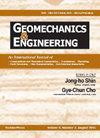基于支持向量机的巷道工作面稳定性确定性与概率分析
IF 2.4
3区 工程技术
Q2 ENGINEERING, CIVIL
引用次数: 4
摘要
本文提出了一种利用支持向量机分类器对巷道工作面稳定性进行确定性和概率性评价的简便方法。该方法包括两个主要步骤,即训练数据集的构建和基于实例的分类器的确定。第一步,在确定影响巷道工作面稳定性因素的范围和水平后,利用正交设计产生具有代表性的样品。然后,OptumG2中嵌入的二维强度降维分析对训练数据集进行标记。对于任何未知的实例,第二步应用训练数据集进行分类,这是由一个特设的Python程序实现的。未知样本的分类首先使用k近邻算法选择基于实例的训练样本,然后构建基于实例的SVM-KNN分类器。它最终提供未知实例的标签,避免计算其相应的性能函数。基于SVM-KNN分类器,通过蒙特卡洛模拟进行概率评估。计算不稳定样本数与模拟样本总数之比,作为失效概率,并与响应面法进行验证和比较。本文章由计算机程序翻译,如有差异,请以英文原文为准。
Deterministic and probabilistic analysis of tunnel face stability using support vector machine
This paper develops a convenient approach for deterministic and probabilistic evaluations of tunnel face stability using support vector machine classifiers. The proposed method is comprised of two major steps, i.e., construction of the training dataset and determination of instance-based classifiers. In step one, the orthogonal design is utilized to produce representative samples after the ranges and levels of the factors that influence tunnel face stability are specified. The training dataset is then labeled by two-dimensional strength reduction analyses embedded within OptumG2. For any unknown instance, the second step applies the training dataset for classification, which is achieved by an ad hoc Python program. The classification of unknown samples starts with selection of instance-based training samples using the k-nearest neighbors algorithm, followed by the construction of an instance-based SVM-KNN classifier. It eventually provides labels of the unknown instances, avoiding calculate its corresponding performance function. Probabilistic evaluations are performed by Monte Carlo simulation based on the SVM-KNN classifier. The ratio of the number of unstable samples to the total number of simulated samples is computed and is taken as the failure probability, which is validated and compared with the response surface method.
求助全文
通过发布文献求助,成功后即可免费获取论文全文。
去求助
来源期刊

Geomechanics and Engineering
ENGINEERING, CIVIL-ENGINEERING, GEOLOGICAL
CiteScore
5.20
自引率
25.00%
发文量
0
审稿时长
>12 weeks
期刊介绍:
The Geomechanics and Engineering aims at opening an easy access to the valuable source of information and providing an excellent publication channel for the global community of researchers in the geomechanics and its applications.
Typical subjects covered by the journal include:
- Analytical, computational, and experimental multiscale and interaction mechanics-
Computational and Theoretical Geomechnics-
Foundations-
Tunneling-
Earth Structures-
Site Characterization-
Soil-Structure Interactions
 求助内容:
求助内容: 应助结果提醒方式:
应助结果提醒方式:


